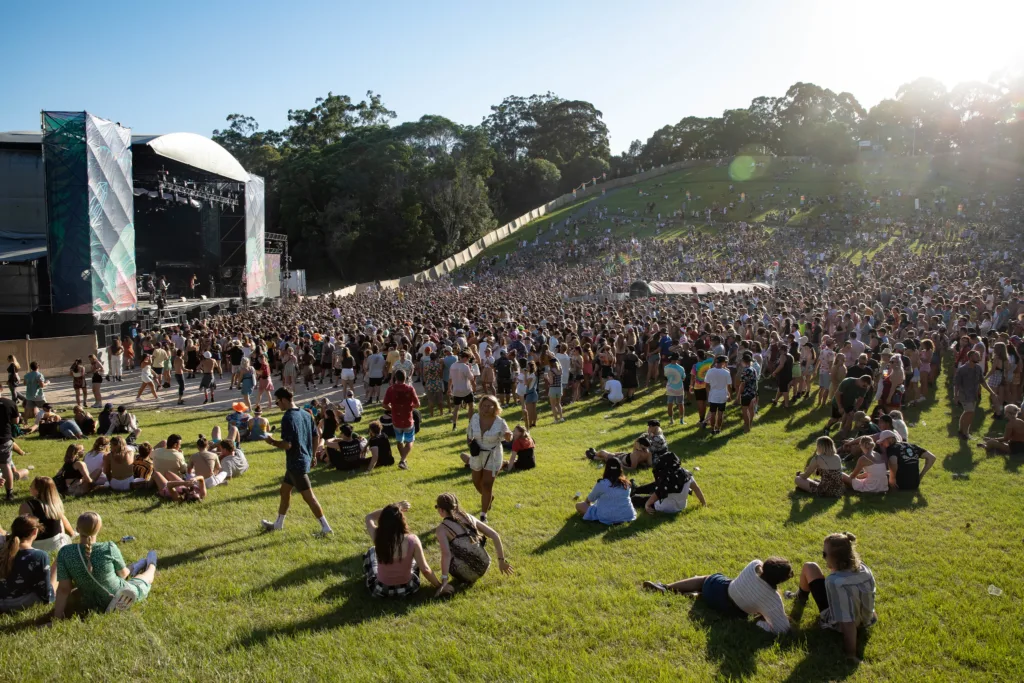While Australia's festival scene awaits federal support, there are some in-house changes to improve its relationship with the environment.
 Festivals are an indelible part of Australian culture, as well as a big economic driver. : Aranxa Esteve, Unsplash Unsplash licence
Festivals are an indelible part of Australian culture, as well as a big economic driver. : Aranxa Esteve, Unsplash Unsplash licence
While Australia’s festival scene awaits federal support, there are some in-house changes to improve its relationship with the environment.
Australia’s festival season is in full swing and it’s already brought a raft of highlights – King Stingray staking their claim as Australia’s next great rock band, Fred again fever running rampant with Gen Z and the announcement that Kylie Minogue will grace the stage in Byron Bay at Splendour in the Grass.
But a shadow hangs over all the positivity and power chords, as the live music scene reckons with another existential crisis just years after the pandemic rocked it to its core.
A combination of the cost-of-living crisis, a post-pandemic surge in operational expenses and the intensifying climate crisis has Australia’s festival scene under siege with a murky future.
There is a lot riding on the sector overcoming these challenges. Festivals are tourism drivers, especially in regional areas, and benefit community wellbeing. They are a vibrant part of Australian culture and are beneficial for the wellbeing of attendees.
Yet these benefits are at risk as the climate crisis deepens.
March 2024 has reminded us of the worst of it: Victoria’s Pitch festival cancelling midway through due to an extreme fire risk, and after a 23–year-old man died from a suspected drug overdose.
But even when the consequences aren’t deadly, the shifting climate threatens the ability to consistently run festivals at any point on the Australian calendar.
Increased temperatures, drought, flood, extreme heat, bushfires and changes in biodiversity, water availability and pests and weeds have jeopardised the feasibility of festivals which used to run with little environmental resistance.
While there are many factors behind the cancellation of music festivals, a big fear is that extreme heat will cause serious health issues. But this is not the only concern.
Regional festivals are often staged to build communities and economies. But this means attendees are often placed in fire-prone areas at the height of fire season. As was the case with attendees at Pitch, which faced backlash for pushing ahead given the dangerous weather conditions over that weekend.
There is no legislation or regulations to drive climate action at festivals. There is little financial assistance and few incentives for festival organisers to think strategically about climate change.
Failure to plan and adapt for climate change could be the death knell for Australia’s festival scene, which is already struggling amid the cancellation of regional touring staple Groovin’ the Moo and a “perfect storm” of rising costs and changing consumer behaviour.
What results is a complex two-way relationship between festival events and climate change.
On the one hand, festivals themselves are significant emitters of greenhouse gas, particularly through their transport and energy use. But festivals also offer an opportunity to showcase best practice in combating climate change, serving as platforms to educate, inform and influence behaviour among attendees.
The most important things for organisers to think about are reducing the negative impacts and boosting the positives for the local community and for the environment.
Many festivals have been trailblazers in this — the Woodford Folk Festival in Queensland has engaged in environmental initiatives such as tree planting, land and wildlife management, recycling, alternative energy sources and actively encouraging patrons to use public transport.
Woodford also goes beyond to educate attendees about environmental issues and uses its influence to advocate local and state governments on green causes.
In South Australia, the Adelaide Festival has been certified as Australia’s first carbon neutral arts festival. It encourages attendees to use social media as a vehicle to share messaging around being environmentally friendly.
Festivals also provide us with opportunities to express and share our ideas about our communities and places, which in turn can help bring about social change.
Such was the goal of the Clunes Booktown Festival in regional Victoria, initiated as a response to the community’s population decline, a longstanding drought, weakened local agriculture, high unemployment, an ageing population and a resultant struggling local economy.
If there’s one thing we’ve learned from COVID-19 and the recent periods of bushfire, heatwave and flooding disasters, it’s that the arts sector is vital in caring for individuals and communities dealing with challenging circumstances.
Participation and enjoyment at music festivals help individuals and communities regulate negative emotions and find new and creative ways to reconnect and create feelings of belonging.
A festival can contribute to changing people’s capacities to act, and this is where its significance in generating sustainable and resilient communities lies. As the effects of climate change continue to bite, the capacity for recovery, resilience and transformation offered by public events like music festivals will be more important than ever.
Michelle Duffy is Associate Professor in the School of Environmental and Life Sciences at the University of Newcastle.
Judith Mair is Associate Professor at the UQ Business School, University of Queensland.
Originally published under Creative Commons by 360info™.







